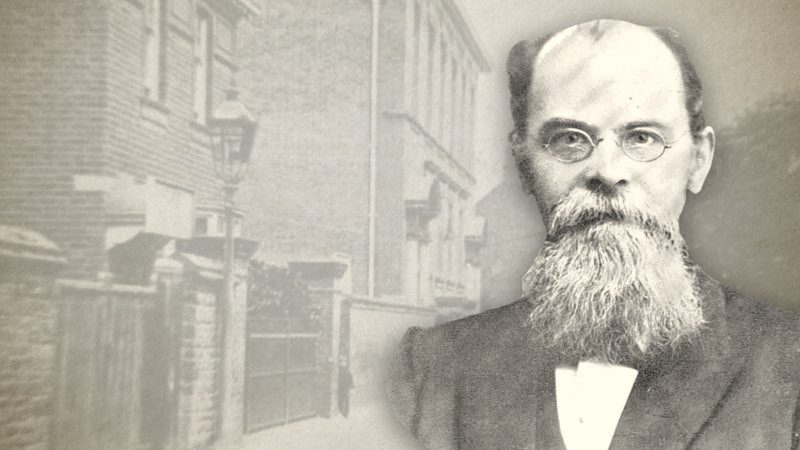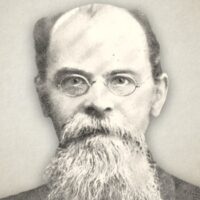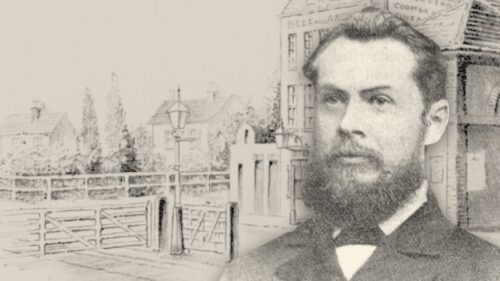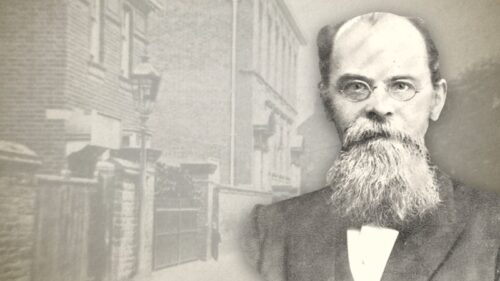
The Life And Testimony Of Ebenezer Marsh
Earthen Vessel 1913:
In Memoriam
Mr. Ebenezer Marsh
“Your fathers, where are they? and the prophets, do they live for ever?” Nothing is at a stay in this world;
“Time, like an ever-rolling stream,
Bears all its sons away.”
Our esteemed brother Marsh has joined the ranks of “the spirits of just men made perfect.” The tongue, so often heard in the Churches magnifying his Lord and Master, lies silent in the grave, and he can no more wield the pen in the behalf of His cause. He has passed for ever from the stage of this world, but his memory is with us still, and these lines are designed to keep that memory in a measure among our readers.
In compiling this brief sketch of our brother, we are greatly indebted to our friend Mr. R. Mutimer, from whom we have received an account of his early life, conversion and call to the ministry, delivered at his recognition as pastor at Wellingborough. Much, therefore, that we write will be autobiography. The statement made runs thus:—
“It was my privilege to be born of godly parents, and, while I have lived to prove that my Christianity does not rest in this fact, I have learned to count it an unspeakable privilege that it was so. I was born at Glinton, in Northamptonshire, on August 5th, 1853, and while it was my happy lot to have one of the most godly of mothers to watch over me in infancy, and a father to plead at the throne of grace for the new-born child, I soon gave evidence that I was born in sin and shapen in iniquity. And as I grew up the evil principles of my ruined nature rapidly developed, and no person present has more cause to say,
‘O to grace how great a debtor
Daily I’m constrained to be!'”
Before he was five years of age the Lord took his mother home to Himself, but he ever retained a tender regard for her memory. This was shown in after-years when he walked thirty-five miles to Wellingborough to see her grave in one day, and did the return journey the next day, and so blistering his feet that it was nearly a week before he could bear to put them to the ground. The lack of his mother’s care and the evil influence of a servant, whose character his father was unaware of, proved very injurious to him, as we see by taking up his own narrative again:—
“At about the age of 10 or 11 I was particularly addicted to lying, stealing and swearing; indeed at this time, except in the presence o! my father, I could hardly speak without an oath. Yet all this time I was so convinced that I was a sinner in the sight of God, that many a night I have tried to keep awake lest I should die in my sleep and go to hell; yet, as soon as morning dawned, I would pilfer things to sell at school and lie and swear until night came again, when I was afraid to go to bed once more. About this time my father took a shop at Greenwich. He had an apprentice, who for some time it was my delight to torment, and, seeing how it grieved him to hear me swear, I would do it until every blasphemous expression I could think of was repeated. This young man, however, was destined to be the means in God’s hand of deepening my convictions and causing me to cry for mercy as I had never done before and in after-years to value the example he set me. After swearing at him one day to such a degree that he wept, he said, ‘Eb, you won’t hurt me; it is yourself you hurt. What will become of your soul?’
“At this I only swore the more, but that night when I got to bed I dared not close my eyes; I could only lay and cry for mercy. Now my distress continued and became an intolerable burden. I was almost afraid to speak lest I should swear. My agony of soul became so great that I determined to put an end to my existence. I was then only about 13 years of age. Never shall I forget the instrument I designed for my destruction dropping from my hand and the piercing cry of that hour—“God be merciful to me a sinner.” At times I would hope there was pardon for such a wretch as I; at others I dared not hope. Oh, how watchful was I lest I should say or do anything wrong now, and how I longed to know if there was mercy for me!”
At this time he was attending Zion Sunday-school, Deptford, then under the pastoral care of Mr. J. S. Anderson, an address from whose lips much affected him. He thus describes his experience at this period of his life—“How at this time I longed for Sunday to come, that I might go to Zion Sunday-school, yet only to have my sorrow increased by hearing of salvation, while the sentence of death was ever with me. But I could not keep away, for I could say—
‘I love to meet among them now,
And at Thy gracious feet to bow,
Though vilest of them all.’
Nor could I let my teacher know what was passing in my mind, for I was sure he would conclude that it was the work of the Lord, and I believed I was a deceiver, and felt I was only adding sin to sin by leading others to think I was a changed character; yet well I knew there was a change. I specially delighted to remain at the teachers’ monthly prayer-meetings and hear teacher after teacher plead for their scholars…My father’s apprentice was now my closest friend…We often talked till midnight about our souls’ welfare…How many a Sunday night have we walked home from the Surrey Tabernacle together, after hearing the late beloved James Wells, and our hearts have burned together, though neither of us at that time could realise that we were ‘vessels of mercy.’ Oh what grief filled my heart on the day that, his apprenticeship out, Henry Walter left my father’s house. I felt I had lost all, for to him alone could I tell the burden of my heart and longings after Christ.”
These experiences were followed by a season of self-righteousness, only again to be succeeded by deep despondency, almost amounting to utter despair. We return to his own account again:—
“With no hope, and believing I should after all be lost, I was led in the providence of God to Brentford, and here was the turning point of my whole life. I found out the chapel in North Road, and one Sunday, standing in the lobby, a young man came to me and said, ‘Won’t you come in?’ and thus began the union with my beloved brother T. B. Voysey, for he it was who spoke to me. From attending this chapel I became acquainted with the godly family of the Jeffs, with its branches of Voysey and Fromow, and the three happiest years of my life up to that time were spent among them.”
Here our brother received many encouragements and helps by the way, but was often greatly cast down, notwithstanding these tokens for good. His deliverance must be told in his own words:—
“Hoping against hope, I was returning from Richmond one Lord’s-day evening, and, while standing on the middle of Kew Bridge these words came home to my soul with almighty power—‘WE KNOW THAT WE HAVE PASSED FROM DEATH UNTO LIFE, BECAUSE WE LOVE THE BRETHREN.’ No words can describe the joy of my heart. The experience of years passed before me in a moment—the pleadings for pardon through the blood of Christ, the love to all those that loved Him, all the dealings of God both in providence and grace, were made to pass before me that night; and, as I pleaded ‘the blood of Christ, which cleanseth from all sin,’ my joy was unbounded. I knew I loved the brethren, and here I was assured from God’s own mouth that it was a proof that I had ‘passed from death unto life.’ I never saw it in such a light before. I wept for joy. Oh what a view I had of that cleansing blood, the cross and sufferings of Christ for me! I longed to tell someone of my joy.
“I was soon after this removed to Yarmouth. The ministry of Mr. Reynolds was greatly blessed to my soul in leading me to see the glory of the doctrines of grace. They became my meat and drink. As I became established in the truth, I experienced the freedom these truths reveal…On Lord’s-day, May 31st, 1875, it was my happy privilege to put on Christ by baptism, and the following Lord’s-day was received into the Church.”
Thus we have learned from his own words some of the exercises of our brother’s soul as he was led to the sure Refuge of sinners. The exigencies of space have compelled us to pass over many interesting particulars contained in the statement from which we have been drawing. But God had appointed him for the ministry, and there was much exercise of mind before him. From early days he had had a conviction that he would one day be a preacher of the Gospel, but he shrank back with fear from doing anything himself that should lead to his so doing.
But we again call him to speak for himself. He says:—”I commenced a Sabbath-school in connection with the Cause at Yarmouth, and it was my delight to give addresses to the children. Monthly meetings were held among the members and friends, at which I was occasionally asked to speak. Several of the members expressed their belief that I should be called to preach the Gospel. But now I began to fear lest it should be so, and cried to the Lord to take away such thoughts, lest I should be tempted to use any means to bring it about.
“Up to this time I had mentioned my exercise of mind to no one. But one day Mr. Reynolds came to me and asked me plainly if I had never been exercised about the ministry. I was greatly surprised he should ask me such a question, and merely replied, ‘Well, I suppose all who love the Lord are anxious to tell the good news of salvation to others.’ ‘Ah,’ he said, ‘but that’s not what I mean. Have you not sometimes felt you would be called to preach?’ I was compelled to acknowledge it was so, but begged him to tell no one about it, for I was sure that if it were of the Lord He would bring it about.”
Three years passed—years of exercise of mind—ere our brother occupied a pulpit to speak in his Master’s name. Mr. Reynolds had left Yarmouth and Mr. Marsh had become the Church secretary. In that capacity he wrote to Mr. H. Knights, of Lowestoft, to go to Yarmouth for Lord’s-day, May 4th, 1879. Mr. Knights consented to go, but only on condition that Mr. Marsh would occupy his pulpit at Tonning Street. There he commenced the work which was to engross his whole being in his future life. He continued to supply the pulpit at Tonning Street two or three Lord’s-days a month until the following April. Other invitations followed, and on the first Lord’s-day in November he preached for the first time at Laxfield, which was to be the scene of his first pastorate. He commenced a twelve-months’ engagement there on the first Lord’s-day in May, 1881, was chosen pastor on the last Lord’s-day in November, and recognition services were held on April 27th, 1882.
Some happy and fruitful years followed, but an increasing family, with the difficulty of educating his children at Laxfield, began to press upon him, and on November 30th, 1890, he preached farewell sermons, having received an unanimous call to the pastorate at the Tabernacle, Wellingborough. Here his labours were greatly blessed; but, after something over three years, certain things arose which led to his resignation, to the great grief of the people. In April, 1894, he commenced his ministry at Gurney Road, Stratford, where he continued, with many signs following, until July, 1904, when he removed to Warboys, Hunts. His stay there was short, and in October, 1907, he took a three years’ engagement at Bethersden, Kent. And in August, 1912, commenced at Hope, Bethnal Green, from which sphere he removed to the better country on Wednesday, October 22nd, 1913, after three months’ severe illness.
For the greater part of his affliction he realised much of the presence of the Lord. “My times are in His hand” was a passage greatly blessed to him. Toward the close of his illness the adversary was permitted at times to buffet him severely, but he ”over- came by the blood of the Lamb,” and almost the last word that could be caught by his wife was ”Happy, happy.”
Our brother’s official connection with the EARTHEN VESSEL AND GOSPEL HERALD commenced at the close of 1899, when he began to assist the writer of this sketch to conduct it. Very efficient help he rendered until 1904, when Mr. W. J. Styles became editor, with Mr. J. E. Flegg as his assistant. In 1912, owing to pressure of work, Mr. Flegg resigned, and Mr. Marsh resumed his old position, and, on the retirement of Mr. Styles, became sole editor, which position he filled until illness struck the pen from his hand.
On Monday, October 27th, the mortal remains were laid to rest, “till He comes,” in Ealing Cemetery, in the presence of a large and representative gathering, and not far from where his beloved friend and brother Mr. T. B. Voysey’s remains also rest awaiting the Master’s call. The address at the grave was delivered by Pastor H. T. Chilvers, the deceased’s son-in-law, according to an arrangement entered into some years ago. The interment was preceded by a service at the Baptist Chapel, North Road, Brentford, which was filled with sympathising friends and ministerial brethren from various parts of the country as well as London. Pastor R. Mutimer, the first seal of Mr. Marsh’s ministry at Laxfield, at the special request of the departed, conducted the whole of the services and preached the funeral sermon on the following Lord’s-day at Brentford to a crowded congregation. The writer delivered an address in the chapel on the funeral occasion, and several brethren took part in the service.
A widow and eleven children—eight daughters and three sons— remain to lament the loss of a loving husband and father. Nearly all—if not all—the children are following in the steps of their father. This was one of his great comforts, though he wanted assurance that all were manifestly the Lord’s.
Mr. Marsh was too well known to need any eulogy. His praise is in the Churches. He spared no labour in His Master’s service, and was ever ready to serve his brethren to the utmost of his ability. He was a man of much prayer, earnest and fervent in spirit, with a very passion for souls. There are not a few who under God owe their salvation to him instrumentally. Like David, he “served his own generation by the will of God” and then “fell on sleep.” We say, Farewell, dear brother, till the shadows flee away and the resurrection morning dawns.
Edward Mitchell
——————
In Memoriam—Ebenezer Marsh
He lives in memory, day by day,
The father who has passed away—
The preacher whose luxuriant tone
Had keys and octaves all its own,
Whose messages of mercy rolled
In numbers through the silent fold.
Poor “Hope!” what disappointed hearts
Are in thee as thy star departs!
Although, as one has said before,
The Lord can send “a thousand more
Of greater beauty” blazing round
Above your moist and gloomy ground.
Nor “Hope” alone his light will miss;
His life was full of industries;
And far and near he toiled and fought
For the dear sheep his Master bought
With lip and pen he sowed the Word,
And many have believed who heard.
So, down the ages, one by one
The servants of Jehovah pass,
And fond and flattering elegies
Spring over them like blades of grass,
As soon to die. Yet it is sweet
To sing when love and duty meet.
Head of the Church, Thy hand we see;
We cast our sorrow upon Thee;
Praising the mercy which has blest
And taken him to such a rest.
His call, his gifts, his seals, shall be
Thy glory through eternity.
M. A. Chaplin
Galleywood
Ebenezer Marsh (1853-1913) was a Strict and Particular Baptist preacher. He served as Pastor for churches in Laxfield, Wellingborough, Stratford, Warboys, Bethersden and Bethnal Green. We also served as President for the Metropolitan Association of Strict Baptist Churches and Editor for the Earthen Vessel.





